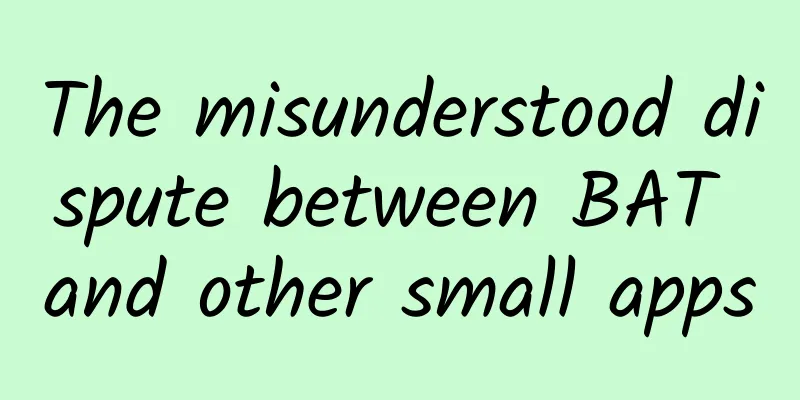The misunderstood dispute between BAT and other small apps

|
Mini Programs are the last blue ocean of traffic in the consumer Internet era, and this seems to have become a common understanding in the current business community. For major companies that have been drifting in various red oceans for a long time, Mini Programs have also become a life-saving straw in their eyes and a good cure to relieve their anxiety. In this regard, the technology giants represented by BAT have made great contributions. They have helped to spread this story and made it more convincing. Along with this, words such as the competition for BAT's mini-programs and the secret competition between BAT's mini-programs have popped up from time to time, which also satisfies the "melon-eating" needs of many people. But is this really the case? What does the real picture of the competition between BAT mini-programs look like? "Picky Eater" Mini Program: Watch the Tide Rise, Watch the Tide FallWeChat was the first to launch and also experienced the peak period of mini programs, but why did it fail to achieve industry unification? At the beginning of this year, data showed that WeChat Mini Programs have covered more than 200 sub-industries. In the past year, WeChat Mini Programs have served more than 100 billion users, with an annual transaction growth of more than 600%, creating more than 500 billion in commercial value. It seems good, but a closer look reveals some problems. According to the "2019 Mini Program Insight Report" released by Questmabile, from the perspective of industry distribution, games are still the focus of WeChat Mini Programs, with the number of mini games accounting for as high as 42.1%, followed by industries such as practical tools and mobile shopping. Unlike the initial boom of mini programs, which attracted a large number of users, mini programs have clearly become "picky" since last year: not all industries are suitable for WeChat mini programs, and not all players are eligible to earn dividends from WeChat mini programs. In addition, more and more entrepreneurs have found such a pessimistic situation: Mini Programs cannot replace Apps at all, and it is difficult to expand the business by relying on Mini Programs, because the traffic is public traffic, and it is difficult or even impossible to become one's own private traffic. This is also true for many popular game mini programs, such as "Jump Jump" that swept the country two years ago, which inexplicably became a down-and-out Internet celebrity overnight, and most of the brands that enjoy the most dividends are still those with a certain reputation. This can also be seen from the change in investors’ attitudes. In the beginning, mainstream VCs had to take up a position even if they didn’t understand it, and met many mini-program entrepreneurs every day. Later, VCs said, “We no longer look at mini-program projects.” This was only a few months later. The launch of the Alipay Mini Program seems to have opened another door for industries, companies and entrepreneurs who have not been able to gain a foothold in the WeChat Mini Program, causing another wave of "agitation", but the final result is still that some are happy and some are worried. At present, we can clearly see that Alipay Mini Programs actually attract those scenarios that are strongly related to payment, such as retail or life services, and most of them are companies that have close ties with Alibaba. For example, Hellobike, Taobao, Cainiao Logistics, etc. According to a report released by QuestMobile in the first half of this year, 30% of the top 20 companies in terms of user scale of Alipay Mini Programs in popular fields are from Alibaba, and 25% are from Alibaba. Some mini-programs that have tasted success on WeChat also want to try more channels and have high hopes for Alipay, but the results have not been satisfactory. Soon, there was another ups and downs. After these two times, people gradually began to feel that these traffic platforms seemed to have an invisible barrier. They also realized that WeChat and Alipay were not just another app store, but represented a new set of game rules. Therefore, when Baidu Mini Program was launched, people seemed to be much more "low-key". There was no impetuousness and noise as in the past two times. Many related developers took a wait-and-see attitude and did not choose to rush in. Because everyone has self-knowledge, those who are suitable will come, and those who are not suitable will not waste so much time. This is why we now see that Baidu Mini Program has not seen the "surge" when WeChat and Alipay were launched before. However, correspondingly, there has been no "ebb", and we can always see its obvious growth, and it can also bring real money conversion to more and more merchants. Compared with WeChat Mini Programs and Alipay Mini Programs, Baidu Mini Programs only account for 10% and 6.7% of Baidu Mini Programs and Baidu-related Mini Programs, respectively. But if you think that Baidu Mini Programs have no barriers to entry in other fields, you are totally wrong. According to a report released by QuestMobile, Baidu Mini Programs account for 23.3% of mobile video and life services, 16.7% of car services, and 10% of mobile shopping and mobile social networking. It seems that the mini programs of BAT are actually the same, and they do not welcome everything as the slogan says. This is also the reason why WeChat failed to achieve unification, and the same is true for Alipay mini programs and Baidu smart mini programs. Radical B, Buddhist A, Conservative T: Product "shackles" determine "parasitic product" genesProducts are like a city. The construction of each city should conform to the local customs and habits, which constitutes the invisible wall of each city. New species that conform to the human nature of the city can often breed and develop quickly. On the contrary, those that do not conform will often be gradually squeezed out due to acclimatization. These squeezed out will naturally move to other cities. If we want to explore the customs and practices of BAT's respective products, we need to judge from the following levels. *Flow characteristics Mini programs are hailed as a new traffic portal, and different industries and companies may require different traffic strategies. WeChat, which advocates "use it and leave it", actually has a static flow, and it has attracted a large number of traffic with its social connectivity. However, Alipay and Baidu app actually have a dynamic flow, and their users are mobile, and they are truly "use it and leave it, and come back when needed". Whether merchants need this kind of immediate entrance with strong purpose and conversion or an entrance like WeChat that can increase activity depends on the individual. *Product Definition WeChat Mini Programs are platform tools, while Alipay Mini Programs and Baidu Mini Programs are tools of tools. Both platforms and tools have their own advantages and limitations. Platform tools usually meet needs and improve experience, while tool tools are usually used to increase the frequency of opening, just like a board and a toolbox stored separately. It is clear at a glance which one will be used more frequently. *Scene Matching From the product's own characteristics, the greatest value of social networking lies in connection. It is easy to form a bundle with pan-entertainment content such as games, so this type of mini-program is naturally popular on WeChat. In addition, WeChat's own tools such as payment, QR code, and public accounts are one of the main entrances to trigger WeChat mini-programs, which also determines that scenarios such as e-commerce that often appear with WeChat payment and life services that often match social networking are more suitable for mini-programs. Alipay mini programs usually have two major features: one is the interactive behavior based on transactions (including balance and Huabei), and the other is the scenario that is deeply related to Sesame Credit, such as some hotel accommodation and commodity pay-later. Then the scenarios such as finance, e-commerce, and life services have strong correlation attributes with it. The biggest feature of Baidu's scene is that it is highly purposeful. Compared with the basic scenes of other competing products, search can reflect people's direct demands. In theory, it can be connected with all scenes, but there are obvious differences in the closeness of the connection. * Infrastructure What can be provided by joining the mini program platform? Tencent is huge social traffic + WeChat payment; Alipay is huge mobile traffic + financial services; and the infrastructure that Baidu can provide is precise search traffic, plus information flow and technology. *Open strategy: The above factors combined together form a final opening strategy with a very different style. WeChat Mini Programs are in a state of platform constraints + product (WeChat) characteristics self-selection. The traffic characteristics determine that it is essentially a closed system, and developers will be subject to various restrictions. Mini Programs are 2C and 2B, but WeChat Mini Programs seem to consider the C-end group more. WeChat's social traffic has long been coveted by many people, but the existence of clauses such as prohibiting induced sharing often makes businesses hesitate. Although it has been opened up a lot now, and some mini programs also have the authority to actively push messages, it is still a bit conservative compared to Alibaba and Baidu. For Alipay, a payment tool, more openness means the extension of payment scenarios, so it will choose to cooperate with Weibo and provide greater support. However, due to its own tool attributes, it mainly looks at the frequency, and the user's usage time is an issue. In this limited time, Alibaba hopes that its products and services will be more exposed, which will bring fewer opportunities to other merchants. This also means that the ceiling of the number of mini-programs that Alipay can carry is actually a bit low. Baidu, unlike Alibaba and Tencent, has a wide layout. The friction between itself and developers in terms of mini-programs is relatively small, but because of this, it is not as good as AT in terms of the bottom line. Therefore, it can only work hard on the degree of openness. First, the platform itself mobilizes more resources to help merchants. It is worth mentioning here that Baidu's mini-programs are usually prefixed with "smart", and technical support including AI marketing is a highlight. Second, by connecting to many external apps, saturated exposure is achieved. It is not limited to Baidu app, thereby increasing the frequency of use as a tool. The radical Baidu, the Buddhist Alibaba, and the conservative Tencent all have different attitudes, but none of them can stop them from heading to their own Rome. Different product tones and open strategies determine what kind of mini-programs are suitable for the platform. Therefore, in the eyes of the Internet Jianghu team, although BAT has made frequent moves in the field of mini-programs, they are actually more like a dynamic balance. Those who are suitable for them will take the initiative to settle in, and those who are not suitable will just be listed with no other actual value. Of course, there will be competition. For example, Tencent and Alibaba, Pinduoduo and Taobao, Tencent Video and Youku Video, Mobike and Hellobike, etc. Will the addition of a small program entrance to each of them have a big impact on the overall situation? In fact, it will not, because the past consumption habits have been formed, and the changes in the market share of each can only come from other factors. For example, Tencent's WeChat Life Payment Mini Program performs well, but this payment scenario is also the highlight of Alipay, so it is inevitable that the two sides will compete. But looking beyond the phenomenon to the essence, this is actually a continuation of the previous competition between Alipay and WeChat Pay. Although the competition seems fierce, in fact, there is a "harmony brings wealth" posture between the two sides, and this balance will not be broken unless there is a disruptive and destructive innovation. Generally speaking, the competition among BAT over mini programs is actually like this. There are overlaps, but overall they are relatively independent, and the three competing parties appear to be very gentlemanly towards each other. The battle for mini programs is actually just a continuation of the consumer Internet battlefield. In this case, the most fierce battle is actually between BAT and their challengers. For example, Alibaba and Meituan’s life services, Toutiao and Tencent’s competition around pan-entertainment, and Toutiao and Baidu’s competition around information flow. These are the key points of competition in the mini program world. The most intense scene in the mini program world is actually between TMs and BAT. As management professor Xiao Zhixing once said: "Some Internet companies are slowly moving from value creation to resource possession, and even to rent-seeking. The reason is that China's Internet is essentially not competing upward, but racing to the bottom." From value creation to resource possession, BAT does not allow challengers to erode its existing resources. Therefore, it is difficult for BAT to be gentlemanly towards Meituan and Douyin. Entertainment, social networking, and life services are their "reverse scales". Once Meituan and Toutiao's mini-programs are established, no one knows whether they will erode the past achievements of Alibaba and Tencent upstream. For example, Douyin itself is a pan-entertainment scene. Compared with the social scene of WeChat, Douyin is more compatible with the scene of mini-games. In fact, we have seen many casual games that have become popular on Douyin today, but users have limited time to use them. There are many disadvantages of algorithm recommendation, but it cannot be denied that it strengthens user stickiness. Then, when more and more users play Douyin mini-games, the corresponding WeChat mini-programs will naturally be "crowded out". According to the 2019 half-year report on mini programs released by QuestMobile, among WeChat mini programs with more than 5 million monthly active users, the proportion of mini games has dropped significantly, replaced by industries such as life services, mobile videos, and practical tools. This is certainly the result of the development of other mini programs, but is there any influence from TikTok? Although there is no relevant data to prove this, the analysis shows that there should be an impact. In addition, Toutiao has been active in mini programs. Last year, the first batch of mini programs, including Toutiao Store, Maoyan Movie, Xiaomi Mall and 58.com Life Assistant, were launched. Not long ago, a "Mini Games" category was added to the main App channel, and a mini program service was directly promoted in the information flow page. The mini programs between Toutiao and Douyin are also connected. It can be said that Bytedance's mini program "ambition" is obvious. As competitors, Tencent and Baidu are naturally unwilling to see its growth. From this perspective, the openness of Douyin may be the important external factor that forces WeChat mini programs to become more open, rather than Alibaba and Baidu. Similarly, the same is true for Alibaba as Meituan and JD.com each launched their own mini-programs. In the future, perhaps as described in the best-selling book "Blue Ocean Strategy", in an overcrowded industrial market, head-on competition can only cause companies to fall into the bloody "red ocean", that is, in a known market space with fierce competition, and compete with rivals for shrinking profits. Compared with horizontal competition, vertical competition in mini programs is the most brutal area, and the improvement of each mini program is more like finding its own differentiation. In fact, there is no end to the consumer Internet. Many traffic platforms are gradually following up with their own mini programs. BAT and their respective challengers will start a new round of head-on confrontation in the battlefield of mini programs, and the fun has just begun. |
<<: Permission issues in Android
>>: Why are foldable phones so popular but so little effective?
Recommend
Do Alibaba and Tencent still have a chance against the latecomers in the shared bike industry?
More than half a month later, ofo officially anno...
18 open source components used by NetEase News iOS version
[[134800]] Third-party open source libraries and ...
Steps to unblock WeChat, how to unblock WeChat?
In fact, sometimes we use one-click forwarding to...
The six core elements of paid community operations!
The threshold for joining paid communities is get...
Why has Douyin recently produced a hit marketing case?
How to prove that a product is popular? From bein...
GAC New Energy Aion LX, China's most technologically advanced luxury car, will be officially launched on October 17
Recently, we learned from GAC New Energy that the...
Feng Xueying's baby massage class
Feng Xueying's baby massage course resources ...
A pack of wolves set out for a secret training camp. The secret behind the big shot of "Seed Washing Technique" is so simple
The wolves set out for a secret training camp. Th...
Is it that difficult to see clearly about content entrepreneurship?
Luo Zhenyu held a meeting on content entrepreneur...
How to build a SaaS product from 0 to 1
For a SaaS product, it is very important to build...
The "most beautiful highway" is newly launched, and visitors can "check in" at the picturesque Three Gorges along the route
Recently, the Ministry of Culture and Tourism, th...
How to stimulate users to participate in activities? You might as well learn storytelling from NetEase Yanxuan APP
From the full-discount activities of O2O such as ...
Bird Lover Week is here! Why do these beautiful birds love this place?
Birds are an important part of the ecosystem. Eff...
315 Public Relations Firefighting Guide! (Collect now)
The legendary annual International Butt Wiping Da...
Sweating profusely one second and generating electricity the next, what turns the human body into a generator?
The recent hot weather is really hot. As soon as ...









